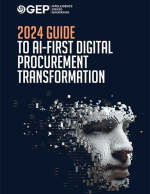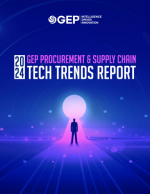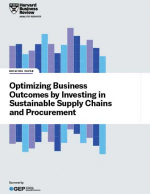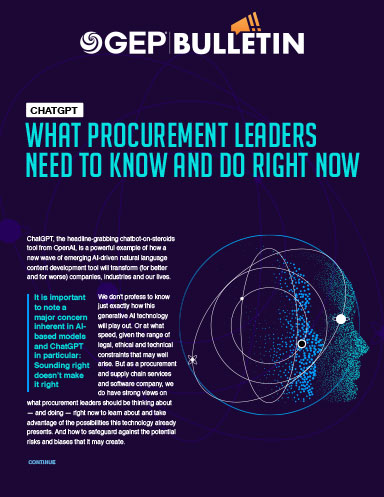ChatGPT - What Procurement Leaders Need to Know and Do Right Now
ChatGPT, the headline-grabbing chatbot-on-steroids tool from Open AI, is a powerful example of how a new wave of emerging AI-driven natural language content development tool will transform (for better and for worse) companies, industries and our lives.
We don’t profess to know just exactly how this generative AI technology will play out. Or at what speed, given the range of legal, ethical and technical constraints that may well arise. But as a procurement and supply chain services and software company, we do have strong views on what procurement leaders should be thinking about - and doing - right now to learn about and take advantage of the possibilities this technology already presents. And how to safeguard against the potential risks and biases that it may create.
Before stating any recommended use cases, it is important to note a major concern inherent in AI-based models, and ChatGPT in particular: Sounding right doesn’t make it right. The outputs from these AI-enabled search queries can be very convincing and at times accurate. But they should not be accepted as correct, unbiased or even useable without applying real judgement, validations and controls.
What Procurement Can Pilot Test With ChatGPT
With that said, here are some practical use cases that procurement teams can pilot today to test this free-for-the-moment tool and understand its value and limitations. This is just the tip of the iceberg. One only needs to run a few test queries on this tool to appreciate the transformative power these software models will deliver someday.
Leverage for Rapid Research
ChatGPT provides solid and instantaneous outputs to common procurement research activities such as:
- Performing market research
- Searching for new suppliers, products or capabilities
- Distilling lengthy research reports into pithy extracts for rapid learning
Test for Procurement Process Efficiencies
It did a more than adequate job of creating solid drafts and performing initial cuts of tasks such as:
- Drafting initial RFPs, SOWs and other contract types
- Aggregating and classifying spend data as per the UNSPC taxonomy
- Cleansing and analyzing spend data, e.g., identifying ‘parent-child’ supplier linkages, etc.
Analyze for Decision Support Applications
Again, ChatGPT did an efficient first-level job of:
- Analyzing inventories for available items across the network
- Evaluating risks of stockouts based on stock levels and consumption rate scenarios
- Strengthening supplier/supply market risk monitoring (e.g. “Perform country-level sentiment analysis for early warning signals”)
- Triaging pay-cycle bottlenecks (e.g. “How many invoices are due from supplier X by March 31?”)
Download the paper to learn on what ChatGPT can do for you!
What’s Related




Favorites





